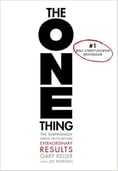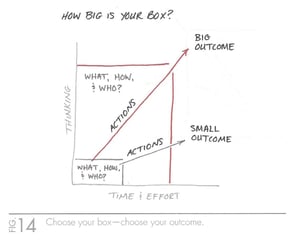Do you remember the movie City Slickers?
Curly (Jack Palance) asks Mitch (Billy Crystal) what the secret of life is. If you would need a reminder watch the 33 second video.
One of my primary efforts with my customers for Annual and Quarterly Planning is to identify their One Thing for the year and for each quarter. Do you have your One Thing identified for 2016 and the first quarter?
We are continuing to review the Six Lies that keep us from achieving our One Thing from Gary Keller’s The ONE Thing: The Surprisingly Simple Truth Behind Extraordinary Results.
Keller shares these six lies about success preventing us from living our One Thing:
- Everything Matters Equally
- Multitasking
- A Disciplined Life
- Willpower Is Always on Will-Call
- A Balanced Life
- Big Is Bad
Today we visit the final lie, Big is Bad.
Before Sam Walton opened his very first Wal-Mart, he envisioned a business so big he felt he needed to go ahead and set up his future estate plan to minimize inheritance taxes. Sam Walton thought big, long before he made it big. In doing so he was able to save his family an estimated $11 to $13 billion in estate taxes. Imagine that! Transferring the wealth of one of the greatest companies ever built as tax-free as possible requires thinking big from the beginning.
Keller believes Big is Bad is the worst lie of all. Why?
IF you fear big success, you either avoid it or sabotage your efforts to achieve it.
None of us truly know the limits of our human potential. Keller points out, “Borders and boundaries may be clear on a map, but when we apply them to our lives, the lines aren’t so apparent. I was once asked if I thought thinking big was realistic. I paused to reflect on this and then said, “Let me ask you a question first: Do you know what your limits are?” “No,” was the reply. So I said that it seemed the question was irrelevant. No one knows their ultimate ceiling for achievement, so worrying about it is a waste of time.”
“What if someone told you that you could never achieve above a certain level? That you were required to pick an upper limit which you could never exceed? What would you pick? A low one or a high one? I think we know the answer. Put in this situation, we would all do the same thing—go big. Why? Because you wouldn’t want to limit yourself. When you allow yourself to accept that big is about who you can become, you look at it differently.”
Big is Bad puts limits on our achievements. Have you ever driven a golf cart? They put governors on them to prevent you from going too fast. Do you want the same kind of limitations on your life?
Are you guilty of self-limiting beliefs?
Thinking big is essential to extraordinary results. Success requires action and action requires thought. The only actions of a springboard to big success, are those formed by big thinking to begin with.
Make this connection and the importance of how big you think can sink in!
What you build today either empowers or restricts you tomorrow.
Here’s some keys to think about why thinking big is so powerful. On your journey to achieving big, you get bigger. Big requires growth, and by the time you arrive, you’re big, too! Your thinking, your skills, your relationships, your sense of what is possible and what it takes, all grow on the journey to big.
As you experience big, you become big.
What Are You Thinking?
Carol S. Dweck, Ph.D., is one of the world's leading researchers in the field of motivation and the Lewis and Virginia Eaton Professor of Psychology at Stanford University. She’s studied how our self-conceptions influence our actions. Her work offers great insight into why thinking big is such a big deal.
Dweck’s work with children revealed two mindsets in action—a “growth” mindset that generally thinks big and seeks growth and a “fixed” mindset that places artificial limits and avoids failure.
Growth-minded students, as she calls them, employ better learning strategies, experience less helplessness, exhibit more positive effort and achieve more in the classroom than their fixed-minded peers. They are less likely to place limits on their lives and more likely to reach for their potential. Dweck points out that mindsets can and do change. Like any other habit, you set your mind to it until the right mindset becomes routine.
Don’t Fear Big
Your first step might be simply not to fear big.
Instead fear mediocrity.
Fear waste. Fear the lack of living to your fullest.
When you fear big, you either consciously or subconsciously work against it. You run toward lesser outcomes and opportunities or you simply run away from the big ones. If courage isn’t the absence of fear, but moving past it, then thinking big isn’t the absence of doubts, but moving past them.
Big stands for greatness. It equals extraordinary results.
BIG IDEAS
Keller closes every chapter with Big Ideas to sum up each Lie. Here are his Big Ideas on Lie #6: Big is Bad:
- Think big. Avoid incremental thinking that simply asks, “What do I do next?” This is at best the slow lane to success, and, at worst, the off ramp. Ask bigger questions. A good rule of thumb is to double down everywhere in your life. If your goal is ten, ask the question: “How can I reach 20?” Set a goal so far above what you want that you’ll be building a plan that practically guarantees your original goal.
- Don’t order from the menu. Apple’s celebrated 1997 “Think Different” ad campaign featured icons like Ali, Dylan, Einstein, Hitchcock, Picasso, Gandhi, and others who “saw things differently” and who went on to transform the world we know. The point was that they didn’t choose from the available options; they imagined outcomes that no one else had. They ignored the menu and ordered their own creations. As the ad reminds us, “People who are crazy enough to think they can change the world are the only ones who do.”
- Act bold. Big thoughts go nowhere without bold action. Once you’ve asked a big question, pause to imagine what life looks like with the answer. If you still can’t imagine it, go study people who have already achieved it. What are the models, systems, habits and relationships of other people who have found the answer? As much as we’d like to believe we’re all different, what consistently works for others will almost always work for us.
- Don’t fear failure. It’s as much a part of your journey to extraordinary results as success. Adopt a growth mindset, and don’t be afraid of where it can take you. Extraordinary results aren’t built solely on extraordinary results. They’re built on failure too. In fact, it would be accurate to say that we fail our way to success. When we fail, we stop, ask what we need to do to succeed, learn from our mistakes and grow. Don’t be afraid to fail. See it as part of your learning process and keep striving for your true potential.
This chapter makes me realize how I’ve been limiting my own potential. I plan to work with my customers to help them think and win big.
Are you thinking big for 2016 and your first quarter?






.jpeg?width=150&height=135&name=Hand%20with%20marker%20writing%20the%20question%20Whats%20Next_%20(1).jpeg)

